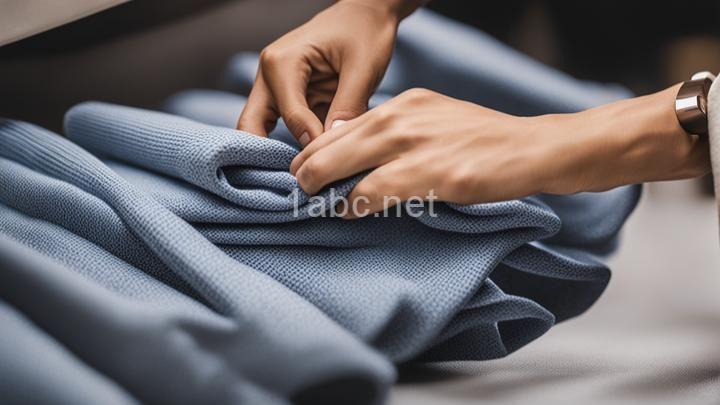The Dos and Don'ts of Washing and Drying Delicate Clothing
Introduction:
I. Dos:
1. Read the Care Label:
2. Hand Wash or Use Gentle Cycle:
3. Use Cold Water:
4. Use Mild Detergent:
5. Separate Colors and Fabrics:
6. Treat Stains with Care:
7. Dry Flat or Hang Dry:
II. Don'ts:
1. Don't Overload the Washer:
2. Avoid Aggressive Washing Techniques:
3. Don't Use Fabric Softener:
4. Skip the Dryer:
5. Say No to Ironing (If Possible):
Conclusion:

The Ultimate Guide to Washing and Drying Delicate Clothing: Dos and Don'ts for Long-Lasting Beauty
Introduction:
Welcome to our friendly guide on caring for your delicate clothing! Delicate fabrics require extra attention to ensure they stay beautiful and last longer. Whether you have silk blouses, lace dresses, or cashmere sweaters, following the right care instructions is crucial. In this comprehensive guide, we will walk you through the dos and don'ts of washing and drying delicate clothing, helping you maintain their pristine condition for years to come.
I. Dos:
1. Read the Care Label:
Before washing any delicate garment, always check the care label instructions. These labels provide specific guidelines tailored to each item's fabric composition. Some fabrics may require hand washing, while others can be machine washed on a gentle cycle. By following the care label, you can minimize the risk of damaging your delicate clothes.
2. Hand Wash or Use Gentle Cycle:
For fragile fabrics like silk, lace, or cashmere, hand washing is often the safest option. Fill a clean sink or basin with cold water and a gentle detergent. Gently agitate the garment in the water, paying attention to any stained areas. Rinse thoroughly and squeeze out excess water without twisting or wringing. If you prefer using a machine, select a gentle cycle specifically designed for delicates.
3. Use Cold Water:
Washing delicate clothing in cold water helps prevent colors from fading and minimizes shrinkage. Cold water is gentle on delicate fibers compared to hot water, which can cause them to weaken or break. By opting for cold water, you can ensure that your delicate garments retain their vibrant colors and original shape.
4. Use Mild Detergent:
When washing delicate clothing, it's important to use a mild detergent specially formulated for delicates. Harsh detergents can damage fragile fabrics, so choose one without bleach or enzymes. Look for detergents that are specifically labeled for delicate fabrics, as they are designed to be gentle and effective at removing dirt and stains without causing harm.
5. Separate Colors and Fabrics:
Sorting your delicate clothing by color is essential to avoid color bleeding. Wash lights, darks, and brights separately to prevent any unwanted color transfer. Additionally, separate different fabric types to prevent friction damage during washing. Fabrics like silk or lace should not be washed with heavier fabrics like denim or towels, as the friction can cause delicate fibers to break or tear.
6. Treat Stains with Care:
Stains happen, but it's important to treat them with care when dealing with delicate clothing. Pre-treat stains gently using a stain remover suitable for delicate fabrics. Apply the stain remover directly to the affected area and let it sit for a few minutes before washing. Avoid rubbing vigorously, as it may cause further damage to the fabric. Instead, gently blot the stain with a clean cloth or sponge.
7. Dry Flat or Hang Dry:
Air-drying is the best method for most delicate garments. After washing, reshape the garment and remove any excess water by gently squeezing or rolling it in a clean towel. Lay it flat on a clean towel or hang it carefully away from direct sunlight or heat sources. Hanging delicate clothes with padded hangers can help them maintain their shape. Avoid using wire hangers, as they can leave creases or stretch the fabric.
II. Don'ts:
1. Don't Overload the Washer:
To ensure proper cleaning and care for your delicate clothing, avoid overloading the washer. Crowding the machine can lead to excessive friction and stretching of delicate fabrics. Give your clothes enough space to move freely during the wash, allowing the detergent and water to effectively clean each item.
2. Avoid Aggressive Washing Techniques:
Delicate fabrics require gentle handling throughout the washing process. Avoid using aggressive washing techniques such as vigorous scrubbing, twisting, or wringing. Instead, handle garments gently and allow the detergent to do its work. Aggressive washing can damage delicate fabrics and cause them to lose their shape or develop snags and tears.
3. Don't Use Fabric Softener:
Fabric softeners may leave residue on delicate fabrics, affecting their appearance and feel. Instead of using fabric softener, opt for a gentle fabric conditioner specifically designed for delicates if desired. Always check the care label to see if fabric softener is recommended for your specific garment.
4. Skip the Dryer:
High heat from dryers can shrink, warp, or fade delicate clothes. Whenever possible, avoid using the dryer and choose air-drying methods. If you must use the dryer, select the lowest heat setting and use a gentle cycle. Remove the clothes promptly to prevent wrinkles and reshape them if necessary. Remember, air-drying is the safest option for delicate clothing.
5. Say No to Ironing (If Possible):
Ironing delicate clothing can be harsh on fragile fabrics and may cause irreversible damage. If possible, avoid ironing delicate garments. However, if ironing is necessary, use the lowest heat setting and place a cloth between the iron and the garment to protect it from direct heat. Gently press the iron over the cloth without applying too much pressure.
Conclusion:
Caring for delicate clothing doesn't have to be intimidating with these simple dos and don'ts. By following these guidelines, you'll keep your delicate garments looking lovely for years to come. Remember to always prioritize gentleness when handling and cleaning your cherished delicate pieces. With proper care, your delicate clothes will retain their beauty and remain a staple in your wardrobe for a long time.
FREQUENTLY ASKED QUESTIONS
How should I wash delicate clothing?
When washing delicate clothing, it's important to take extra care to avoid damaging the fabric. Here are some steps you can follow:
- Read the care label: Start by checking the care label on the clothing item. It will provide specific instructions on how to wash and care for the garment.
- Sort by color and fabric: Separate your delicate items from regular laundry and sort them by color and fabric type. This will help prevent color bleeding or damage caused by different fabrics rubbing against each other.
- Use a gentle cycle: When using a washing machine, select the delicate or gentle cycle. This cycle typically uses slower agitation and shorter washing time, which reduces the risk of damage.
- Use cold water: Opt for cold water instead of hot or warm water as it is gentler on delicate fabrics and helps to preserve their quality.
- Choose a mild detergent: Use a mild, pH-neutral detergent specifically designed for delicate fabrics. Avoid using bleach or harsh chemicals that can weaken or discolor the fabric.
- Place items in a mesh laundry bag: To further protect delicate items, consider placing them in a mesh laundry bag. This will prevent them from getting tangled or snagged during the washing process.
- Hand wash if necessary: For particularly delicate items, like silk or lace, it may be best to hand wash them. Fill a basin or sink with cool water and add a small amount of gentle detergent. Gently swirl the garment in the water, then rinse and pat dry with a clean towel.
- Air dry: Always air dry delicate clothing instead of using a dryer. Hang or lay the clothes flat on a clean, dry surface away from direct sunlight or heat sources. This will help prevent shrinkage or damage caused by high heat.
Remember to always follow the care instructions provided by the manufacturer to ensure the best results and extend the lifespan of your delicate clothing.
Can I put delicate clothing in the washing machine?
It depends on the specific clothing item and its care instructions. Delicate clothing typically requires special care to prevent damage. Some delicate clothes can be safely washed in a washing machine using a gentle or delicate cycle, while others may need to be hand-washed or taken to a professional cleaner. To be sure, always check the care label on the item or refer to the manufacturer's instructions for the recommended washing method.
What type of detergent should I use for delicate clothing?
When it comes to washing delicate clothing, it's important to choose a gentle detergent that is specifically formulated for delicate fabrics. Look for detergents that are labeled as "delicate," "gentle," or "for fine fabrics." These detergents are typically milder and contain fewer harsh chemicals, which helps to minimize damage to delicate fabrics like silk, lace, or cashmere. Additionally, it's a good idea to avoid using bleach or any detergents with bleach additives, as they can be too harsh for delicate clothing.
Should I use hot or cold water when washing delicate clothing?
When washing delicate clothing, it is generally recommended to use cold water. Cold water helps to minimize color fading, prevent shrinkage, and reduce the risk of damaging delicate fabrics. It is also a good idea to use a gentle cycle and mild detergent specifically designed for delicate fabrics. Make sure to always check the care label on your garments for any specific instructions or recommendations.

